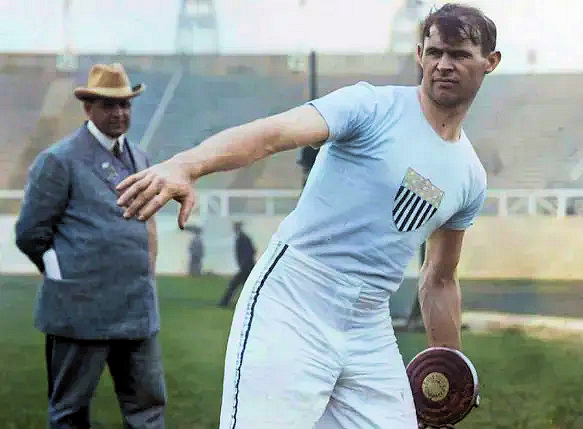
In his obituary, the New York Times describes Martin Sheridan as “one of the greatest athletes the United States has ever known.” While his name may not be as readily recognized today, that assessment still holds true. Sheridan was born in Bohola, County Mayo, Ireland in 1881, and would later emigrate to the United States. A giant for his time standing at 6′ 3″, he was a member of a group known as the “Irish Whales,” a group of Irish American Athletes who were also members of the New York City Police Department who dominated the track and field competitions of the early twentieth century.
He won his first gold medal at the St. Louis Olympics in 1904 in the discus, an event he was to dominate during his career. In the 1906 Olympics he would again easily win the discuss gold, but also a gold medal in shot putt, and silver in the standing long jump, the standing high jump and stone-throwing. He was the odds on favorite to win the pentathlon before having to withdraw due to a leg injury.
Sheridan is perhaps best remembered for an incident in the 1908 London Games. The games were mired in controversy from the start. It was the first games to have an “Opening Ceremony” and the now traditional parade of nations marching into the stadiums. Before the opening ceremony, it was noticed by the American team that while the stadium was surrounded with the flags of various nations (including the flags of China and Japan who were not competing), the British hosts had omitted the flag of the United States, claiming “they couldn’t find one.” Some Irish Athletes had already withdrawn when told they would be required to march behind the British flag.
The British organizers had issued a “protocol document” that instructed each team to dip their Country’s flag in homage as they passed King Edward VII in the royal box. When the U.S. contingent marched past, Color Bearer Ralph Rose refused to dip the American flag (allegedly after another Irish American competitor and NYPD officer Mathew McGrath had told Rose along the parade route “Dip that flag and you will be in a hospital tonight”.) . When questioned by British organizers, Martin Sheridan, the team captain, reportedly responded, pointing to the American Flag, “That flag dips before no earthly king.” While revisionists have questioned if Sheridan uttered those exact words, it is recorded that British officials did confront Rose, and the team, lead by Sheridan, quickly made clear that they supported his actions.
While retiring from Olympic competition, Martin Sheridan would continue a distinguished career to with the NYPD until his death one day before his 37th Birthday in 1918; Sheridan was one of the first victims of the infamous 1918 Flu epidemic.
The Unjust Downgrading of Sheridan’s 1906 Medals
Unfortunately. Martin Sheridan and other competitors of the 1906 Olympics, including Ireland’s Gold Medalist Peter O’Connor, have been cheated of their due recognition by the International Olympic Committee (IOC) when they decided to retroactively downgrade the 1906 Olympics and not recognize the medals awarded at that competition. In the infancy of the Olympic movement, the process of holding an Olympics was still evolving. After the 1900 and 1904 games had not successfully built upon the success of the initial 1896 Olympics in Athens; it was proposed to hold the Olympic games every two years, alternating between Athens, as the birthplace of the Olympics, and an international site. The 1906 Games were promoted as an Olympics by the IOC, had better participation than the two previous Olympics, and gave rise to many of the Olympic Traditions that are still practiced today (formal opening and closing ceremonies, the idea of athletes being members of a national team, an Olympic village where the athletes from around the world stay and socialize, the raising of the flags during medal presentations).
There may have initially been some cold, if unjust, logic in demoting the 1906 Olympic games and its medals given at the time its one-off nature, but since then the Olympics has engaged in many similar “one-offs”; most notably the 2021 games, which were five years from the prior Olympics and the 2024 Olympics which are only three years from the 2021 games. There is simply no reason, other than arbitrary obstinacy, for the IOC not to recognize Martin Sheridan and the other competitors of the 1906 Olympic Games medals as Olympic medals.